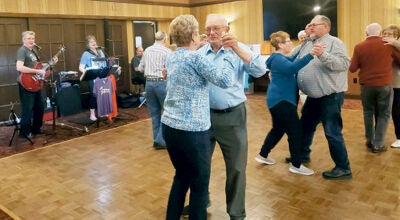John G. fought in the Civil War
Published 5:51 am Wednesday, December 16, 2009
“Without truth, which everyone understands, and to which therefore everyone willingly subordinates himself, all authority is naked force, a cage which sooner or later falls to pieces under the pressure of the need for truth.” — Franz Kafka
One might ask what Kafka is saying. I might say good question.
The other night, I read aloud “A Little Woman” by Kafka at work, just before closing time. It was seven pages long and a bit of the eighth page. His picture is featured on the cover entitled “Kafka, the Complete Stories.”
I’m not sure what so attracts me to Kafka, perhaps it’s his never-ending words and choice of words, words that are translated from the Czech language to English. I hope there are a few others out there in the Herald world who enjoy Kafka. Perhaps they can submit their thoughts to the Herald.
The young man that offers the book, “Conversations with Kafka” is also featured in “A Romantic Education” by Patricia Hampl. She too walked with Janouch. She is a St. Paul poet and author who was featured with the Page Turners not so long ago.
By my math, Janouch is currently 88 if he is still alive or if he’s not. I didn’t see him when our Czech “Bohemian delegation” went to Prague a couple years ago. Perhaps we walked past him.
My mother was Norwegian, but there just isn’t enough to say about Norwegians accept for John G. Johnson. He is connected on my mother’s side. He fought in the Civil War, was wounded and escaped from Andersonville. He later wrote a paper entitled “Sketch of a Soldier and Prison Life of a Member of the Third Iowa Infantry During the Civil War, from 1861 to 1865.”
A hundred years after his enlistment, I graduated here from high school and a hundred years after John G. was discharged, I graduated from college, a coincidence.
After escaping Andersonville, he was working his way to get through to the Northern Army, to “Sherman’s Army.” Instead, he was caught attempting to escape and was told, “You will never get there, let me assure you of that, you little Yankee pup.”
“Very well,” I says, “You have the power to do with me as you will.”
He then said “Being you ain’t sassy, I will not shoot you just now.”
They marched him to a building in the ground. He was there five days with “little or nothing to eat” before he escaped.
“I wandered through the woods, and finally I met a (slave). I motioned to him. I knew I could depend upon him. He came to me and I told him to follow me. We went into a thick grove with a lot of underbrush and sat down. I told him who I was. He couldn’t answer. He was so frightened. Finally, he said, ‘Are you a Lincoln Soldier?’ I said, ‘Yes sir.’ ‘Is it so they tell me that you Yankees are trying to free the slaves? I said, ‘Yes, you are free now, and you don’t know it.’
‘What can I do for you,’ he said. ‘Well, that was what I was going to ask you. Can’t you get me something to eat?”
“He went at once, and in about two or three hours he came back with quite a lot of edibles, and they were also good. We stayed and chatted for a long time. He told many things. He told me about the roads. He told me about the scouts of the Rebel Army, that they were all over the country scouting for prisoners that had made their escape from Andersonville and other prisons. He cautioned me to be careful and never to be afraid of a darky. “They will always help you,” he said.
I have not been down to Andersonville yet but my second cousin Mike Bibus, and his wife Maureen have been there. Maybe someday I will get there.
The story ends on page 33 where John G., while at Keokuk, Iowa writes: “We laid in the hospital there a short time. One evening, I told my companion that I was going to take French leave and go home. I gave him my address if anything should come up while I was gone. I came home to here to Minnesota, Austin being my nearest place.
Lydia, our daughter, calls him 4G because John G is her great-great-great grandfather.




